
Catch a Fire is the fifth studio album by the reggae band Bob Marley and the Wailers, released in April 1973. It was their first album released by Island Records. After finishing a tour in the United Kingdom with Johnny Nash, the band did not have enough money to return to Jamaica; they approached producer Chris Blackwell, who agreed to advance the Wailers money for an album and paid their fares back home, where they recorded Catch a Fire. The album has nine songs, two of which were written and composed by Peter Tosh, the remaining seven were by Bob Marley. After Marley returned with the tapes to London, Blackwell reworked the tracks at Island Studios with contributions by Muscle Shoals session musician Wayne Perkins, who played guitar on three overdubbed tracks. The album had a limited original release under the name The Wailers in a sleeve depicting a Zippo lighter, designed by graphic artists Rod Dyer and Bob Weiner; subsequent releases had an alternative cover designed by John Bonis featuring an Esther Anderson portrait of Marley smoking a "spliff", and used the name Bob Marley and the Wailers.

John Lester Nash Jr. was an American singer-songwriter, best known in the United States for his 1972 hit "I Can See Clearly Now". Primarily a reggae and pop singer, he was one of the first non-Jamaican artists to record reggae music in Kingston.
"No Woman, No Cry" is a reggae song by Bob Marley and the Wailers. The song was recorded in 1974 and released on the studio album Natty Dread.

Bob Marley and the Wailers were a Jamaican reggae band led by Bob Marley. It developed from the ska vocal group, The Teenagers, created by Marley with Peter Tosh, and Bunny Wailer in 1963. By late 1963, singers Junior Braithwaite, Beverley Kelso, and Cherry Smith had joined the group. By the early 1970s, Marley and Bunny Wailer had learned to play some instruments, and brothers Aston "Family Man" Barrett (bass) and Carlton Barrett (drums), had joined the band. The line-up was known variously as: The Teenagers, the Wailing Rudeboys, the Wailing Wailers, then Bob Marley and the Wailers, with three albums between 1971 and 1973 credited to The Wailers. After Bunny Wailer and Peter Tosh left the band in 1974, Marley continued with new band members which included the Barrett brothers, Junior Marvin and Al Anderson on lead guitar, Tyrone Downie and Earl "Wya" Lindo on keyboards, and Alvin "Seeco" Patterson on percussion. The "I Threes", consisting of Judy Mowatt, Marcia Griffiths, and Marley's wife, Rita, provided backing vocals.

Alpharita Constantia Marley is a Cuban-born Jamaican singer and the widow of Bob Marley. She was a member of the vocal group the I Threes, along with Marcia Griffiths and Judy Mowatt, who gained recognition as the backing vocalists for Bob Marley and the Wailers.
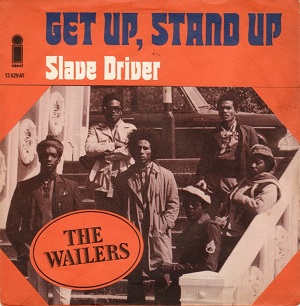
"Get Up, Stand Up" is a song written by Bob Marley and Peter Tosh. It originally appeared on The Wailers' 1973 album Burnin'. It was recorded and played live in numerous versions by Bob Marley and the Wailers, along with solo versions by Peter Tosh and Bunny Wailer. It was later included on the compilations Legend and Rebel Music, as well as live recordings such as Live at the Roxy among others. In 1973, "Get Up, Stand Up" peaked at number 33 on the Dutch Top 40. In 1986, it peaked at number 49 in New Zealand.
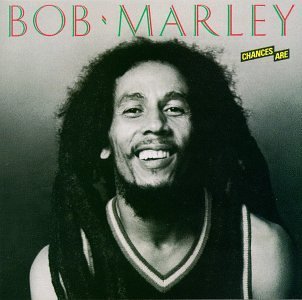
Chances Are is a compilation album by Bob Marley released in 1981 by WEA International throughout the world, and through the Cotillion imprint of Atlantic Records in the U.S.
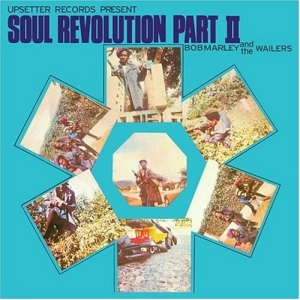
Soul Revolution Part II is the third album by Bob Marley and the Wailers. It was produced by Lee "Scratch" Perry. While the name on the album cover for all the original releases was Soul Revolution Part II, the name Soul Revolution was printed on the album label, leading to uncertainty over the correct name of the album.This is made even odder by the fact there isn't any known Bob Marley album with the name Soul Revolution, unless the part II is referring to Soul Rebels. A "dub" version with the vocals removed was released as Soul Revolution Part II Dub. In 1988 both versions were released as one set.
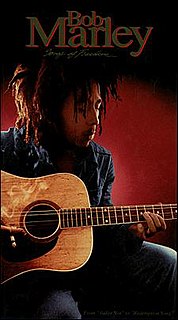
Songs of Freedom is a four-disc box set containing music by Bob Marley and the Wailers, from Marley's first song "Judge Not", recorded in 1961, to a live version of "Redemption Song", recorded in 1980 at his last concert.

The Wailing Wailers is the 1965 eponymous debut album by The Wailers, later known as Bob Marley and the Wailers. Released on the Studio One label, the album is a compilation of various recordings made between 1964 and 1965 by Neville “Bunny” Livingston, Robert Nesta Marley and Peter McIntosh. It compiles what Clement Coxsone Dodd considered the best Wailers recordings from this period. They were accompanied by the Studio One backing band, The Soul Brothers.
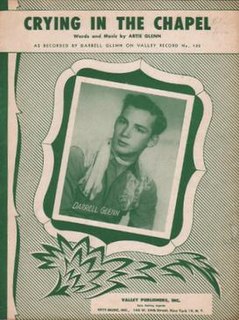
"Crying in the Chapel" is a song written by Artie Glenn for his son Darrell to sing. According to Cliff Glenn, Artie Glenn's oldest grandson, Artie had written the song in 1951 but left it in a drawer for two years, until Darrell recorded it while still in high school in 1953, along with Artie's band the Rhythm Riders. The song was rejected by Hill and Range Songs and Acuff-Rose Music. The song was eventually published by Valley Publishers which also released the single featuring Darrell Glenn. It became a local hit and then it went nationwide. The original version of the song was issued in June 1953. Darrell Glenn's original recording reached number one on the Cash Box chart and number six on Billboard. Glenn's version also hit number six on the Billboard pop singles chart and number four on the Billboard country and western chart, Rex Allen's number eight, The Orioles' number 11, Ella Fitzgerald number 15, and Art Lund reached number 23. Lee Lawrence took his version to number 7 in the United Kingdom.
Formed in 1967 JAD Records was a record label that was co-owned by Johnny Nash, producer Arthur Jenkins, and businessman Danny Sims, whose initials formed its logo. JAD Records was the label which signed Bob Marley, Peter Tosh, Bunny Wailer and Rita Marley to an exclusive long-term contract as recording artists from 1968 to 1972. Other notable artists to sign with the label included Johnny Nash himself, Byron Lee, Neville Willoughby and later Jimmy Cliff.

Most of Bob Marley's early music was recorded with Peter Tosh and Bunny Wailer, who together with Marley were the most prominent members of the Wailers. In 1972, the Wailers had their first hit outside Jamaica when Johnny Nash covered their song "Stir It Up", which became a UK hit. The 1973 album Catch a Fire was released worldwide, and sold well. It was followed by Burnin', which included the song "I Shot the Sheriff". Eric Clapton's cover of the song became a hit in 1974.
"One Love" is a ska song by Bob Marley's original group The Wailers from their 1965 debut studio album The Wailing Wailers. It was rerecorded as part of the 1970 medley "All in One", which contained reggae reworkings of their early ska songs. This was released as a single and is also included on the compilation African Herbsman under the name "All in One".

Robert Nesta Marley was a Jamaican singer, musician, and songwriter. Considered one of the pioneers of reggae, his musical career was marked by fusing elements of reggae, ska, and rocksteady, as well as his distinctive vocal and songwriting style. Marley's contributions to music increased the visibility of Jamaican music worldwide, and made him a global figure in popular culture to this day. Over the course of his career, Marley became known as a Rastafari icon, and he infused his music with a sense of spirituality. He is also considered a global symbol of Jamaican music and culture and identity, and was controversial in his outspoken support for democratic social reforms. In 1976, Marley survived an assassination attempt in his home, which was thought to be politically motivated. He also supported legalization of marijuana, and advocated for Pan-Africanism.
Grooving Kingston 12 is a 3 disc box set of Bob Marley and the Wailers material from the 1967-1972 period released in 2004 by Universal and JAD Records. An update of the Complete Wailers series along with Fy-Ah Fy-Ah and "Man To Man", it contains remastered versions of almost everything released during that period. These compilations were released to put an end to bootlegging and provide royalties to surviving artists and their families, and also to provide the complete discography without buying several separate CDs.

Bruno Blum is a French singer songwriter, guitar player, music producer and musicologist sometimes nicknamed "Doc Reggae". He is mostly known for his work in the reggae, Caribbean music, rock music and African musics fields, and also works as a comic book artist, illustrator, painter, photographer, video director, writer, journalist, music historian, interpreter and speaker.

Neville O'Riley Livingston, known professionally as Bunny Wailer, was a Jamaican singer-songwriter and percussionist. He was an original member of reggae group The Wailers along with Bob Marley and Peter Tosh. A three-time Grammy Award winner, he is considered one of the longtime standard-bearers of reggae music. He was also known as Jah B, Bunny O'Riley, and Bunny Livingston.

Winston Hubert McIntosh, OM, professionally known as Peter Tosh, was a Jamaican reggae musician. Along with Bob Marley and Bunny Wailer, he was one of the core members of the band the Wailers (1963–1976), after which he established himself as a successful solo artist and a promoter of Rastafari. He was murdered in 1987 during a home invasion.

"Guava Jelly" is a song recorded by the Jamaican group Bob Marley and the Wailers. It was released as a 7" vinyl single through Tuff Gong and Green Door Records. It was issued commercially with B-side track "Redder Then Red", which was misspelled on its initial printing, in 1971. It was written and produced by Marley and features uncredited lyrical contributions from Bunny Livingston. A reggae composition like the majority of Marley's works, "Guava Jelly" contains a rocksteady and island-like production with lyrics loosely based around sexual intercourse. His use of the term "guava jelly" was likely referring to a specific type of sexual lubricant. It was favorably viewed by several reviewers, with many of them finding the composition to be sexual and about love. The group placed "Guava Jelly" on several compilation albums, including Africa Unite: The Singles Collection in 2005, and Owen Gray and Herbie Mann created their own versions in 1974 and 1975, respectively.














